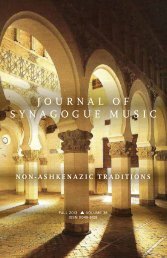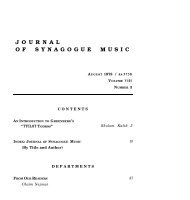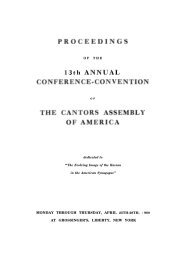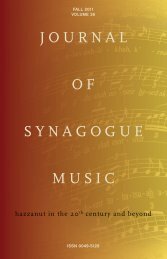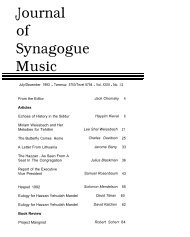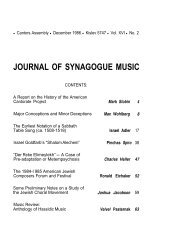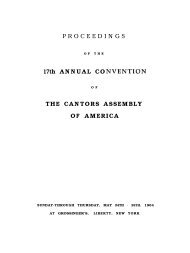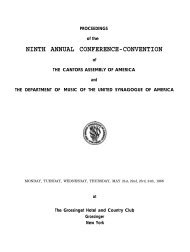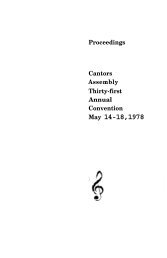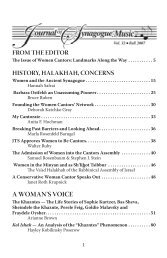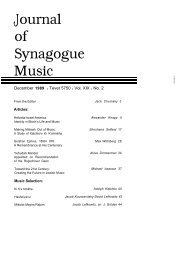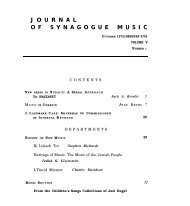Volume 7, Number 3 - Cantors Assembly
Volume 7, Number 3 - Cantors Assembly
Volume 7, Number 3 - Cantors Assembly
You also want an ePaper? Increase the reach of your titles
YUMPU automatically turns print PDFs into web optimized ePapers that Google loves.
MAX WOHLBERG: A RABBI’S CANTOR<br />
31<br />
THEODORE STEINBERG<br />
The name of Max Wohlberg was well-known to me through his<br />
writings in various journals and his reputation as a composer of<br />
liturgical music. Our paths never crossed, however, until I was called<br />
to the pulpit of the Malverne Jewish Center in August, 1968. Hazzan<br />
Wohlberg had been serving there as cantor for about 10 years.<br />
I suddenly found myself in the presence of a man who was a hazzan<br />
for all seasons. I had the pleasure of sharing the pulpit with him<br />
during the last few years of his distinguished career as a synagogue<br />
cantor. Being associated with a true master of Jewish music was a<br />
very special experience. I heard portions of the liturgy sung for which I<br />
never realized there was, or could be, appropriate music. Emet v’yatziv<br />
or a weekday Minha, or selections from the Selihot, which I<br />
thought were meant to be hurried through, for all of these, Max<br />
Wohlberg had a melody, and it was always the right melody. He was<br />
full of musical surpises and, invariably, they were sweet surprises.<br />
Anyone sensitive to the ligurgy and attentive to the meaning of the<br />
works, had the enriching experience of a week-in, week-out garden of<br />
delights issuing forth from Max Wohlberg’s creative musical pen and<br />
mouth.<br />
Max Wohlberg is a diminutive man whose voice is not large or<br />
powerful, yet his masterful control and musical instinct had the effect<br />
of making the words he sang come alive. He helped the worshipper<br />
become more sensitive to the rich possibilities of the liturgy. Certain<br />
prayers, perhaps those which conveyed special meaning to him, were<br />
always sung softly and with reverence. He used his voice, not as a<br />
jewel or adornment in its own right, but as an adornment to the sacred<br />
words he was interpreting.<br />
As every reader of this JOURNAL knows, Max Wohlberg is a fine<br />
scholar who controls the entire range of Jewish liturgical music. It<br />
always seemed to me that he knew the whole prayerbook by heart, as<br />
well as the meaning of every word which he could translate effortlessly<br />
into at least three or four languages. Hazzan Wohlberg was able to<br />
shift from the Ashkenazic to the Sephardic pronounciation with ease,<br />
and I recall one Sabbath morning when he was chanting the service in<br />
the customary Ashkenazic mode: several visitors from Israel walked in<br />
unexpectedly and he immediately switched over to a Sephardic accent.<br />
Rabbi Theodore Steinberg is spiritual leader of the Malveme Jewish Center in<br />
Malveme, New York.



